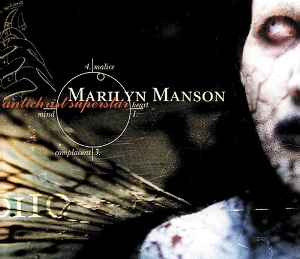
My Dark Twisted Teenage Tunes: Antichrist Superstar
Written by: Pat King, Special to CC2K
 This month I thought I’d do something a little different with my music reviews. Maybe it’s that the Christmas season makes me feel a bit nostalgic or maybe it’s because it leaves me broke. Either way, this month I’m going to look back at some of the albums I really dug during my teenage years, to see if they still hold up.
This month I thought I’d do something a little different with my music reviews. Maybe it’s that the Christmas season makes me feel a bit nostalgic or maybe it’s because it leaves me broke. Either way, this month I’m going to look back at some of the albums I really dug during my teenage years, to see if they still hold up. We’re starting out with what is certainly the most important album of my teenage years. Antichrist Superstar came out in October 1996, just two months after I had turned sixteen. I had always been what you might charitably call a rebellious sort of kid, but if asked why I seemed to never be able to articulate exactly why. Antichrist Superstar was a first step toward realizing what motivated me, what was really going on inside my skullcap. It was a primitive step toward understanding myself, because music can’t help its abstractions. But at least it was a step.
Besides being influenced by the more atheistic Laveyan branch of Satanism, Manson was also familiar with Hegelianism and the the philoddsophy of Nietzsche. Though he never explicitly says so, of course. But Antichrist Superstar was an artistic, and therefore illustrative exploration of these ideas. It was an album of ideas distilled to their emotional core, made palatable to teenagers such as myself. Which meant that for me, without being at all familiar with any of the philosophical subtext, Marilyn Manson was all but inventing the use of shock-art as a method of heightening awareness, and sometimes even consciousness itself.
In fact, the more abstracted the philosophy, the more I liked the song. One of my favorites was the opening track, “Irresponsible Hate Anthem,” which starts the album on a note of pure rage and rejection. “Everybody’s someone else’s nigger,” Manson sings, “I know you are / so am I / I wasn’t born with enough middle fingers / I don’t need to choose a side.” Well, if that doesn’t tell you whether you can relate to the album, the answer is no, you cannot relate to this album.
Musically, the album is somewhere between heavy metal and the neo-industrial sound of Trent Reznor’s Nine Inch Nails. Trent Reznor has a couple songwriting credits on the album as well as a producer credit. Also, Marilyn Manson were signed to Reznor’s Nothing label, so his influence was definitely felt. This not-quite-metal, not-quite-industrial sound had a nice run for a few years, culminating in the soundtrack to David Lynch’s film, Lost Highway. Besides Nine Inch Nails’ own music, Antichrist Superstar is probably the apex of this sound. And Manson’s voice is all over the place, but all various shades of demonic.
I listened to this record, in whole or in part, four times in preparation for writing this article. Even fifteen years after listening to this record for the first time, I still have no idea if the thing holds up all these years later. I suspect it probably does, though you really can’t separate it from the era. I was pretty surprised that the passage of time didn’t help me to see things more objectively. No, it turns out this album is nearly as powerful now as when I was sixteen. And for exactly the same reasons.
